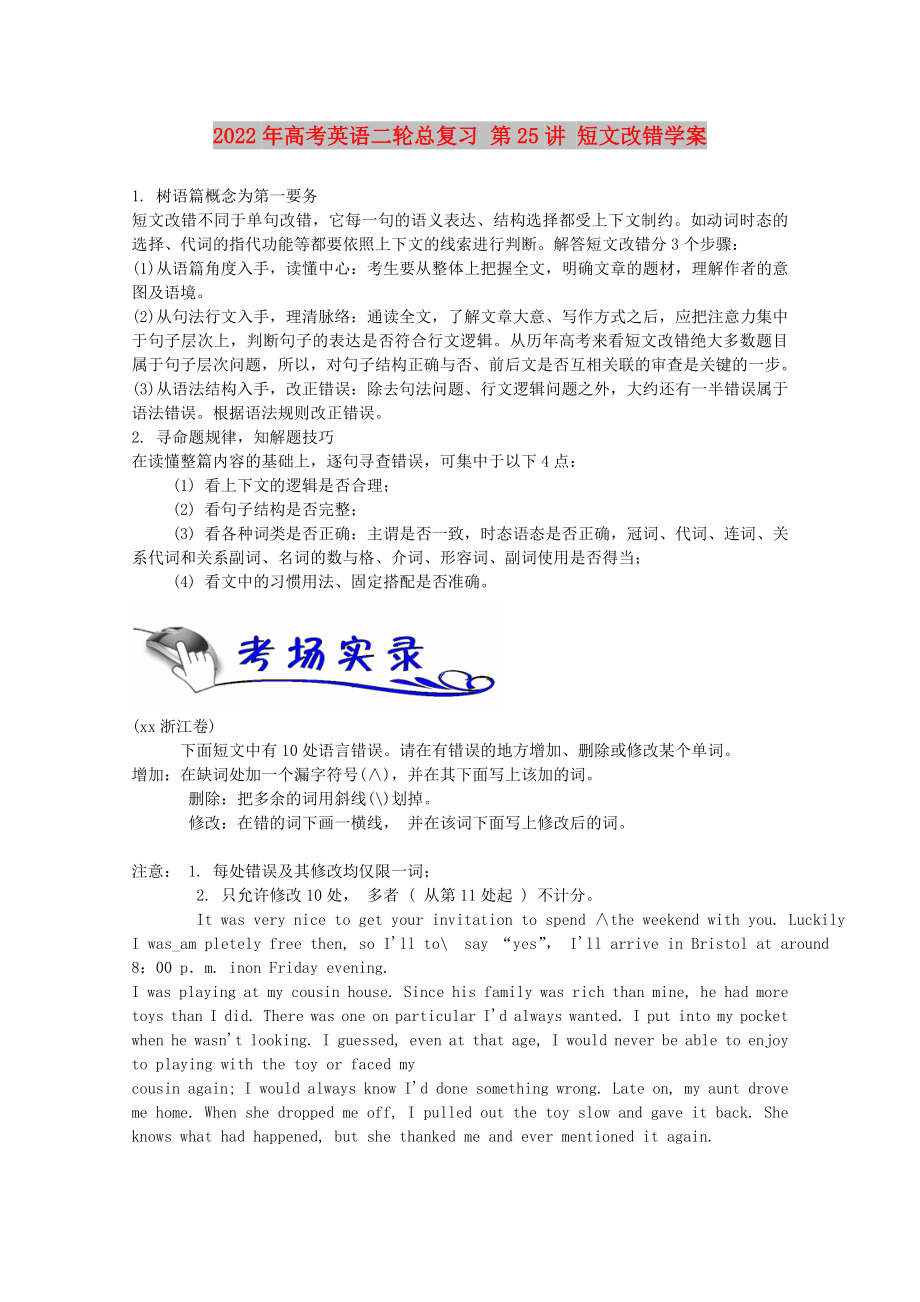《2022年高考英語二輪總復(fù)習(xí) 第25講 短文改錯(cuò)學(xué)案》由會員分享�,可在線閱讀,更多相關(guān)《2022年高考英語二輪總復(fù)習(xí) 第25講 短文改錯(cuò)學(xué)案(2頁珍藏版)》請?jiān)谘b配圖網(wǎng)上搜索�����。
1�����、2022年高考英語二輪總復(fù)習(xí) 第25講 短文改錯(cuò)學(xué)案
1. 樹語篇概念為第一要?jiǎng)?wù)
短文改錯(cuò)不同于單句改錯(cuò),它每一句的語義表達(dá)�����、結(jié)構(gòu)選擇都受上下文制約��。如動詞時(shí)態(tài)的選擇����、代詞的指代功能等都要依照上下文的線索進(jìn)行判斷。解答短文改錯(cuò)分3個(gè)步驟:
(1) 從語篇角度入手�����,讀懂中心:考生要從整體上把握全文�����,明確文章的題材��,理解作者的意圖及語境��。
(2) 從句法行文入手�,理清脈絡(luò):通讀全文�����,了解文章大意、寫作方式之后���,應(yīng)把注意力集中于句子層次上��,判斷句子的表達(dá)是否符合行文邏輯�。從歷年高考來看短文改錯(cuò)絕大多數(shù)題目屬于句子層次問題����,所以,對句子結(jié)構(gòu)正確與否��、前后文是否互相關(guān)聯(lián)的審查是關(guān)鍵的一步��。
2��、
(3) 從語法結(jié)構(gòu)入手���,改正錯(cuò)誤:除去句法問題����、行文邏輯問題之外�,大約還有一半錯(cuò)誤屬于語法錯(cuò)誤���。根據(jù)語法規(guī)則改正錯(cuò)誤。
2. 尋命題規(guī)律����,知解題技巧
在讀懂整篇內(nèi)容的基礎(chǔ)上,逐句尋查錯(cuò)誤����,可集中于以下4點(diǎn):
(1) 看上下文的邏輯是否合理;
(2) 看句子結(jié)構(gòu)是否完整����;
(3) 看各種詞類是否正確:主謂是否一致,時(shí)態(tài)語態(tài)是否正確�,冠詞、代詞����、連詞、關(guān)系代詞和關(guān)系副詞��、名詞的數(shù)與格�����、介詞�、形容詞、副詞使用是否得當(dāng)����;
(4) 看文中的習(xí)慣用法、固定搭配是否準(zhǔn)確�。
(xx浙江卷)
下面短文中有10處語言錯(cuò)誤。請?jiān)谟绣e(cuò)誤的地方
3�����、增加��、刪除或修改某個(gè)單詞����。
增加:在缺詞處加一個(gè)漏字符號(∧),并在其下面寫上該加的詞���。
刪除:把多余的詞用斜線(\)劃掉��。
修改:在錯(cuò)的詞下畫一橫線���, 并在該詞下面寫上修改后的詞�。
注意: 1. 每處錯(cuò)誤及其修改均僅限一詞����;
2. 只允許修改10處, 多者 ( 從第11處起 ) 不計(jì)分��。
It was very nice to get your invitation to spend ∧the weekend with you. Luckily I was_am pletely free then, s
4����、o I'll to\ say “yes”, I'll arrive in Bristol at around 8:00 p.m. inon Friday evening.
I was playing at my cousin house. Since his family was rich than mine, he had more toys than I did. There was one on particular I'd always wanted. I put into my pocket when he wasn't looking. I guessed, even at t
5���、hat age, I would never be able to enjoy to playing with the toy or faced my
cousin again; I would always know I'd done something wrong. Late on, my aunt drove me home. When she dropped me off, I pulled out the toy slow and gave it back. She knows what had happened, but she thanked me and ever menti
6�、oned it again.
【答案】I was playing at my cousincousin's house. Since his family was richricher than mine, he had more toys than I did. There was one onin particular I'd always wanted. I put ∧it/that into my pocket when he wasn't looking. I guessed, even at that age, I would never be able to enjoy t
7�����、o\playing with the toy or facedface my cousin again; I would always know I'd done something wrong. LateLater on, my aunt drove me home. When she dropped me off, I pulled out the toy slowslowly and gave it back. She knowsknew what had happened, but she thanked me and evernever mentioned it again.
8��、此篇短文改錯(cuò)的文章內(nèi)容是一則關(guān)于作者孩時(shí)自我教育的小故事���,試題難度適中�����,要求修改的10處錯(cuò)誤均為學(xué)生寫作中的常見錯(cuò)誤��,設(shè)題考查的內(nèi)容是學(xué)生應(yīng)該掌握的基礎(chǔ)知識�,以考查其發(fā)現(xiàn)問題和解決問題的能力���。
【解析】1.“在我堂兄弟的家”����,考查名詞所有格的用法�,cousin后加's表示“……的”。
2.有比較級的標(biāo)志詞than卻沒有形容詞比較級����,rich的比較級為規(guī)則變化richer。
3.考查習(xí)語搭配in particular�����,意為“尤其���,特別”���。
4. put…into…���,考查動詞用法和代詞,這里漏填了指代那個(gè)玩具的單詞it�。
5. enjoy后面應(yīng)接doing,所以去掉多余的to�����。
6
9��、. 句中有連詞or��,表示后面省略的部分跟前面一致�,為I would never be able to…or I would never be able to…,因此要用動詞原形face��。
7.later on是固定習(xí)語�,意為“后來”,而late作副詞時(shí)意為“遲的�����;最近的”���。
8.這里的“慢”應(yīng)該是說明作者掏兜的動作����,即修飾動詞pull要用副詞slowly。
9.動詞時(shí)態(tài)考點(diǎn)��,通篇文章因?yàn)槭菙⑹鲞^去發(fā)生的一件事�����,所以時(shí)態(tài)基本都為過去時(shí)����,這里不可能出現(xiàn)knows這樣明顯的表示習(xí)慣的一般現(xiàn)在時(shí)����。
10.ever表示肯定含義,而這句作者想表達(dá)的是自己的阿姨知道這件事(偷玩具)但再也沒有提過���,應(yīng)該是否定含義�,故ever換成否定副詞never才對��。
 2022年高考英語二輪總復(fù)習(xí) 第25講 短文改錯(cuò)學(xué)案
2022年高考英語二輪總復(fù)習(xí) 第25講 短文改錯(cuò)學(xué)案

